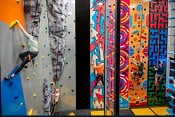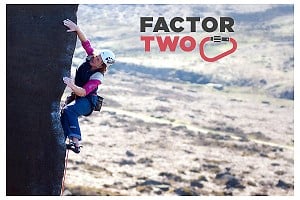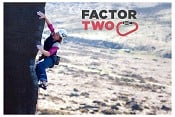
This topic has been archived, and won't accept reply postings.
Is there anyone with experience of getting climbing fit again after a heart attack (mild to moderate, 2 stents fitted) and how long it’s going to take?
Last Wed I ran 2 sessions of about 10k and whilst I was a bit stiff I put that down to being stuck in a car for about 6hrs on Tue.
At 1:10 Thu morning I woke up with chest pains which abated after a while so went back to bed which was when the big one hit.
So now after getting released from hospital I have been told to limit my walking to about 2 sessions of ten minutes a day, avoid unnecessary trips up stairs, not to drive for two weeks and not to do anything that involves pulling or pushing.
At first I didn’t believe that I would suddenly be so unfit, although it has become clear that my stamina is now only a fraction of what it was.
Another interesting observation was that of the approx 30 people on the various Cardiology wards the majority were amateur footballers (they either already knew each other or their visitors did), one who was training to run a marathon, a couple of squash players and some ex military. In short there wasn’t anyone who was obviously unfit or seriously overweight, which seemed to imply that perhaps that group either don’t get heart attacks or would only ever have one.
Last Wed I ran 2 sessions of about 10k and whilst I was a bit stiff I put that down to being stuck in a car for about 6hrs on Tue.
At 1:10 Thu morning I woke up with chest pains which abated after a while so went back to bed which was when the big one hit.
So now after getting released from hospital I have been told to limit my walking to about 2 sessions of ten minutes a day, avoid unnecessary trips up stairs, not to drive for two weeks and not to do anything that involves pulling or pushing.
At first I didn’t believe that I would suddenly be so unfit, although it has become clear that my stamina is now only a fraction of what it was.
Another interesting observation was that of the approx 30 people on the various Cardiology wards the majority were amateur footballers (they either already knew each other or their visitors did), one who was training to run a marathon, a couple of squash players and some ex military. In short there wasn’t anyone who was obviously unfit or seriously overweight, which seemed to imply that perhaps that group either don’t get heart attacks or would only ever have one.
In reply to Mark Edwards:
How long ago did you have a heart attack? How bad was it? Did you have an echocardiogram afterwards? If so what did it show? Were there any wall motion abnormalities?
How long ago did you have a heart attack? How bad was it? Did you have an echocardiogram afterwards? If so what did it show? Were there any wall motion abnormalities?
In reply to willjones:
How long ago did you have a heart attack? – Last Thursday
How bad was it? – First one, so nothing really to compare it with. Felt like a pair of builders had taken sledge hammers to the front and rear of my chest.
Did you have an echocardiogram afterwards? If so what did it show? Were there any wall motion abnormalities? – Yes to the test but not sure of the details, will note the questions and ask the Cardiac Rehab Centre.
It seemed I fell into the average category as my stay was minimal and there weren’t any of the complications that I saw others having.
How long ago did you have a heart attack? – Last Thursday
How bad was it? – First one, so nothing really to compare it with. Felt like a pair of builders had taken sledge hammers to the front and rear of my chest.
Did you have an echocardiogram afterwards? If so what did it show? Were there any wall motion abnormalities? – Yes to the test but not sure of the details, will note the questions and ask the Cardiac Rehab Centre.
It seemed I fell into the average category as my stay was minimal and there weren’t any of the complications that I saw others having.
In reply to Mark Edwards:
Please treat all this as very broad brush since I've no idea how serious your heart attack was compared to mine, nor what damage has been done, nor what meds you are on but...
I had a heart attack nine yers ago actually while climbing, one stent fitted and a week in hospital. Afterwards I could barely walk any distance and suddenly discovered how much uphill there was around my home but I think that was partly die to the meds which I was given, probably to prevent me overdoing things in the first weeks.
I was walking a reasonable distance on flattish ground (5 miles?) in the Dales within 6 weeks, walked up to Stickle Tarn in Langdale the following week and got back on the rock the same week. This was only gritstone severes, slabs only and seconding only (Before the attack I was leading comfortably in the E grades).
Within two and half months I was seconding Chequers Buttress (HVS) and Brown's Eliminate (E1) at Froggatt. Also walked up Scafell Pike around the same time.
By four months I was back soloing gritstone VS and then leading HVs though it felt very hard on the sharp end. A week later I got knocked back on everything I tried at Stanage so it seems to be a case of two steps up and one back
From there it was a question of building confidence and stamina. These days the good news is that I scarcely think about the heart attack though my stamina is nothing like what it was before the attack and there does seem to be a ceiling on how far I can develop it. I get pumped much more easily and much sooner than I remember and recovery is slower. Whether this is due to the heart attack or just being eight years older I can't say.
So the good news is that (assuming your attack was no worse than mine) you can get back into climbing. The bad news is that you may notice a deterioration in performance even after your recovery but, if you are like me, you will find it as enjoyable as ever. As ever the secret is to listen to your body and don't try to rush things.
As I said, I've no way of knowing how much, if any, of this is relevant to your case but I hope it helps.
Good luck
Good luck
Please treat all this as very broad brush since I've no idea how serious your heart attack was compared to mine, nor what damage has been done, nor what meds you are on but...
I had a heart attack nine yers ago actually while climbing, one stent fitted and a week in hospital. Afterwards I could barely walk any distance and suddenly discovered how much uphill there was around my home but I think that was partly die to the meds which I was given, probably to prevent me overdoing things in the first weeks.
I was walking a reasonable distance on flattish ground (5 miles?) in the Dales within 6 weeks, walked up to Stickle Tarn in Langdale the following week and got back on the rock the same week. This was only gritstone severes, slabs only and seconding only (Before the attack I was leading comfortably in the E grades).
Within two and half months I was seconding Chequers Buttress (HVS) and Brown's Eliminate (E1) at Froggatt. Also walked up Scafell Pike around the same time.
By four months I was back soloing gritstone VS and then leading HVs though it felt very hard on the sharp end. A week later I got knocked back on everything I tried at Stanage so it seems to be a case of two steps up and one back
From there it was a question of building confidence and stamina. These days the good news is that I scarcely think about the heart attack though my stamina is nothing like what it was before the attack and there does seem to be a ceiling on how far I can develop it. I get pumped much more easily and much sooner than I remember and recovery is slower. Whether this is due to the heart attack or just being eight years older I can't say.
So the good news is that (assuming your attack was no worse than mine) you can get back into climbing. The bad news is that you may notice a deterioration in performance even after your recovery but, if you are like me, you will find it as enjoyable as ever. As ever the secret is to listen to your body and don't try to rush things.
As I said, I've no way of knowing how much, if any, of this is relevant to your case but I hope it helps.
Good luck
Good luck
In reply to Mark Edwards:
Your doctor should give you advice about what you should be doing. However I would advise for at least the first month or so take it easy, gentle walking is enough. After that I would advise slowly and gradually increasing activity levels, judge how you feel during and afterwards, and be guided by this. If you were previously quite an active person, and it sounds like you were, then I think you really need to pace yourself here.
In the long run, as long as it was a mild heart attack and there is no serious damage to the heart it should be possible to regain a very good level of fitness, perhaps better than before. However it is important to address any factors which may have contributed to putting you at higher risk of a heart attack in the first place. I would say that this is fundamental to a good long term recovery.
Your doctor should give you advice about what you should be doing. However I would advise for at least the first month or so take it easy, gentle walking is enough. After that I would advise slowly and gradually increasing activity levels, judge how you feel during and afterwards, and be guided by this. If you were previously quite an active person, and it sounds like you were, then I think you really need to pace yourself here.
In the long run, as long as it was a mild heart attack and there is no serious damage to the heart it should be possible to regain a very good level of fitness, perhaps better than before. However it is important to address any factors which may have contributed to putting you at higher risk of a heart attack in the first place. I would say that this is fundamental to a good long term recovery.
In reply to Mark Edwards:
The fact that Will knows what ECG stands for and knows technical phrases like wall motion abnormalities suggests he knows far more about this than I do so I'd take careful heed of his advice and treat my post as a one-off anecdote which may not even be relevant to your case
The fact that Will knows what ECG stands for and knows technical phrases like wall motion abnormalities suggests he knows far more about this than I do so I'd take careful heed of his advice and treat my post as a one-off anecdote which may not even be relevant to your case
In reply to Mark Edwards: I had an angioplasty in October, three stents. Still can't understand why a lifetime of endurance sports didn't protect me. Rehab has been pathetic after inadequate assessment designed for people who never leave a sofa. It appears to be essential to get back soon to controlled exercise after stents. I started with short two miles walks on flat, now find I am moving much as normal on halfday walks. Despite lack of support from the nhs I am now back in the gym, but wearing a heart monitor, whichI will also wear on day walks when the weather improves. Don't know how I will respond to long uphill walks. Be positive! Be interested to hear what drugs you are supposed to be taking - I seem to have too many designed to lower an already low b.p.
In reply to Mark Edwards: I have been told that walking with poles is very good after heart surgery as blood is pumped around an extra circuit of the body i.e. legs, arms and brain. But I would check this with your consultant first to see if it would be appropriate in your case. Take care!
In reply to Mark Edwards: Just thought I would add a bit more info and perhaps a warning that those of us used to being active shouldn't make assumptions. I had found myself slower than usual up familiar hill trails and getting out of breath, highly unusual. Didn't link this to the lungs not getting oxygen sufficiently pumped by the heart. Thought it was old age catching up with me. Did a stroll to a pub lunch with an old friend who has a pacemaker who got really worried when I lagged behind him. I had had an ache in the chest under my pack straps, thought I had a chest infection, went to the gp who gave me antibiotics. When they didn't work after two days my wife whisked me off to the gp again - who called an ambulance. Pity he couldn't recognise a heart attack the first time.
In the absence of any help from the nhs I started doing short walks, a mile or so on flat trails, legs felt heavy at first, very slow,but I soon felt able to get back to a normal cadence. My wife came with me, did her the world of good, she lost half a stone. I find the best rehab walk is not too far, perhaps three miles max, but at a brisk pace, rather than a longer slower walk. I am used to using a pair of poles, sort of modified nordic walking style, and these both assist and give my cv system a better work out. Just starting back at the gym wearing a heart monitor set to a maximum heart rate.
The one nhs rehab session I went to involved a truly minimal circuit on gear apparently rescued from a skip. Attitude totally negative. I picked up a tiny dumb bell like those used by girls doing aerobics and was told, that's too heavy (I warm up on 30lbs per arm in the gym, bicep curls). I went up two steps on a primitive step device, got warned again, tried moving sideways on the low step as in step aerobics, got a sarcastic putdown 'oh, you'll put us all to shame'.
I am worried about the number of drugs I am supposed to be taking, most to aggresively lower my normally low blood pressure - I started to get dizzy moments. So I am now querying those. Noone seems interested in finding why I had the problem in the first place. Found I had a cholesterol level nudging into the danger zone years ago which I wasn't told about. I now wonder if a much reduced activity over the last eighteen months - missed my usual month in the alps - allowed the blockage to build up.
So - if you find yourself getting unusually out of breath up hills, don't dismiss the idea of a heart or artery problem - get it looked at, preferably by a gp who knows what he is doing!
In the absence of any help from the nhs I started doing short walks, a mile or so on flat trails, legs felt heavy at first, very slow,but I soon felt able to get back to a normal cadence. My wife came with me, did her the world of good, she lost half a stone. I find the best rehab walk is not too far, perhaps three miles max, but at a brisk pace, rather than a longer slower walk. I am used to using a pair of poles, sort of modified nordic walking style, and these both assist and give my cv system a better work out. Just starting back at the gym wearing a heart monitor set to a maximum heart rate.
The one nhs rehab session I went to involved a truly minimal circuit on gear apparently rescued from a skip. Attitude totally negative. I picked up a tiny dumb bell like those used by girls doing aerobics and was told, that's too heavy (I warm up on 30lbs per arm in the gym, bicep curls). I went up two steps on a primitive step device, got warned again, tried moving sideways on the low step as in step aerobics, got a sarcastic putdown 'oh, you'll put us all to shame'.
I am worried about the number of drugs I am supposed to be taking, most to aggresively lower my normally low blood pressure - I started to get dizzy moments. So I am now querying those. Noone seems interested in finding why I had the problem in the first place. Found I had a cholesterol level nudging into the danger zone years ago which I wasn't told about. I now wonder if a much reduced activity over the last eighteen months - missed my usual month in the alps - allowed the blockage to build up.
So - if you find yourself getting unusually out of breath up hills, don't dismiss the idea of a heart or artery problem - get it looked at, preferably by a gp who knows what he is doing!
In reply to Mark Edwards: Alot of NHS Trust will provide rehab at a local gym, with a cardiac nurse and a programme designed for your personal circumstances, as much as it's inside and gyms are boring, it would allow you to gauge what you are capable of. The nurses will also be trained and equipped with a defib, should the worse happen.
If you are going to do it youself, then take a phone, a 300mg aspirinand your GTN spray (if you've been given one) with you incase, and make sure you stay in an area with a good mobile signal. Maybe start off at your local wall so you've always got people around you.
If you are going to do it youself, then take a phone, a 300mg aspirinand your GTN spray (if you've been given one) with you incase, and make sure you stay in an area with a good mobile signal. Maybe start off at your local wall so you've always got people around you.
In reply to Mark Edwards: Ihad my myocardial infarct whilst soloing on Wallowbarrow,just finished my third route whan it struck.Being a trained nurse knew exactly what it was.Laid down ,rested then changed into tainers ,walked down to the car ,drove home and called an ambulance,in Coronary Care inside the hour.Had climbed 16 of the previous 20 days during which we brought 2 fatal heart attacks down in Wasdale and Eskdale .No family hstory .my mother lived to 110 and was oldest living Scotsperson .Iclimbed 3/4 days a week ran regularly and was Leader of Wasdale Rescue Team as well as mountain biking so reckon Iwas pretty fit for a65 year old Never had a glass of beer in my life.The chap opposite me in CC admitted to drinking 10-12 pints per night and was diagnosed as having indigestion ,weighing more than twice my weight.So much for a healthy life style.Advice from CC was good and I started walking about a mile aday after 10 days and gradually built it up to 10-12 miles a day,got back to climbing after about a month and manage 6b on the local climbing wall and soloing up to about E2 when the mood takes me.Will be into my 80th year next month so there is a silver lining.Just take things easy and build up your fitness listening to your body and backing off when it hurts.Pain is one of the most valuable senses we have if only more people recognised its value to us.Best of luck Mark.PATIENCE IS A VIRTUE.
1
In reply to Mark Edwards:
Thanks everyone, some very interesting comments. Spoke to the Cardio Rehab nurse today and apparently the left cardio pump chamber has been affected, there is a mild irregularity and in her words I may be back to normal in about 6 months.
I have my assessment on the 28th so will take things easy until then and then think about stepping up my exercise level, but living on the side of a hill, that is currently coated in snow with two energetic dogs makes the ‘10 minutes gentle walk’ almost impossible.
Thanks everyone, some very interesting comments. Spoke to the Cardio Rehab nurse today and apparently the left cardio pump chamber has been affected, there is a mild irregularity and in her words I may be back to normal in about 6 months.
I have my assessment on the 28th so will take things easy until then and then think about stepping up my exercise level, but living on the side of a hill, that is currently coated in snow with two energetic dogs makes the ‘10 minutes gentle walk’ almost impossible.
In reply to Mark Edwards: basically it's impossible to generalise. only your cardiologist can really give you good answers to these questions - it depends on which arteries you had stented, where exactly they were stented, degree of stenosis of other vessels, your risk factors, any other comorbidities, the kind of mi you had, what your angio/stress echo showed etc etc
do not take too seriously anything anyone says on here who's not seen you. good luck with it.
do not take too seriously anything anyone says on here who's not seen you. good luck with it.
In reply to BGG: The problem is, finding a cardiologist. My first appointment is four months after discharge. There is apparently no means of getting in touch before that. I get different answers from different doctors at the gp practice, that is, when they deign to respond - they refuse to acknowledge the existence of emails for instance. No response to a direct question from the person named as coordinating rehab in midCheshire. Not surprising I have devised my own rehab especially as early return to planned exercise is recorded as giving fuller recovery.
In reply to Mark Edwards: Just remembered that newcastle-hospitals.org.uk have a very informative website about angioplasty recovery. There is also a general forum which has many interesting comments on experiences. I was given a letter on discharge that promised 'a structured cardiac recovery course' with sessions 'tailored to your individual needs'. What I got after a six weeks wait was a group of a dozen patients with one physio and a nurse trying to struggle round an amateur circuit, two to a station. I was with an elderly woman who had had serious heart surgery. All of us doing the same, geared down to the most damaged person. The attempts at warm up/down were farcical to anyone used to proper circuit training. It was obvious the physio had never instructed an aerobics class. And in any case, one hour a week would not even get a healthy person fit. Good luck with getting a professional rehab from the nhs. I do believe we have to take charge of our own health. Can you drive somewhere for a walk? I went with my wife to an old railways trail a couple of miles away, and a common about four miles away, almost every day. Made all the difference, I was already on the way to recovery by the time of the official rehab session.
In reply to Mark Edwards: Do you enjoy reading ? "The China Study" should be interesting.
Cheers
Dave
Cheers
Dave
In reply to Mark Edwards: hi mark !! i suffered a miocardial infarcton 9 yrs ago i am 61 now and still climbing at vs/hvs....i started climbing 9 mnths into recuperation, but kept running out of steam due to the beta blockers , so i came off those and was able to complete a couple of hvs,s at sharpnose....if you like i would be happy to give you any helpful advice based on my own recovery, but i would prefer if you gave me a call on 01237 431460 after nine is good, would be pleased to help.
regards. paul
regards. paul
In reply to dave frost:
Before wasting time and money reading TCS, read this:
http://rawfoodsos.com/the-china-study/
> (In reply to Mark Edwards) Do you enjoy reading ? "The China Study" should be interesting.
>
> Cheers
> Dave
>
> Cheers
> Dave
Before wasting time and money reading TCS, read this:
http://rawfoodsos.com/the-china-study/
In reply to Shani: Are there any peer reviewed papers or published material thats not just a blog post that supports this stuff ?
In reply to dave frost:
I don't. But then you'll know that The China Study is not peer reviewed either.
With regard to TCS, it is epidemielogical - and correlation does not equal causation. That is the big weakness of T C Cambell's book. I'd recommend some of Ben Goldacre's books for insight in to the weakness of epidemiology.
With regard to the link I posted, you seem quite dismissive of it, but anyone with A'Level maths or similar will be able to follow the gist of the statistical analysis (the articles are quite comprehensive and detailed in this respect), and make up their own mind.
> (In reply to Shani) Are there any peer reviewed papers or published material thats not just a blog post that supports this stuff ?
I don't. But then you'll know that The China Study is not peer reviewed either.
With regard to TCS, it is epidemielogical - and correlation does not equal causation. That is the big weakness of T C Cambell's book. I'd recommend some of Ben Goldacre's books for insight in to the weakness of epidemiology.
With regard to the link I posted, you seem quite dismissive of it, but anyone with A'Level maths or similar will be able to follow the gist of the statistical analysis (the articles are quite comprehensive and detailed in this respect), and make up their own mind.
In reply to Shani: Not dismissive just careful. Anyone can write a blog post. It's gonna take me time to read this stuff and just wondered if there were any other related papers that were similar.
Thing is I did applied maths at university, hated pure, and hated stats and probability even more.
There's also a big chapter in TCS that says correlation doesn't equal causation (the thing about the telegraph poles) so nothing new there. Anyway, i havent quite finished reading yet.
Thanks for the info anyway, plenty more reading to do.
Dave
Thing is I did applied maths at university, hated pure, and hated stats and probability even more.
There's also a big chapter in TCS that says correlation doesn't equal causation (the thing about the telegraph poles) so nothing new there. Anyway, i havent quite finished reading yet.
Thanks for the info anyway, plenty more reading to do.
Dave
This topic has been archived, and won't accept reply postings.
Loading Notifications...








